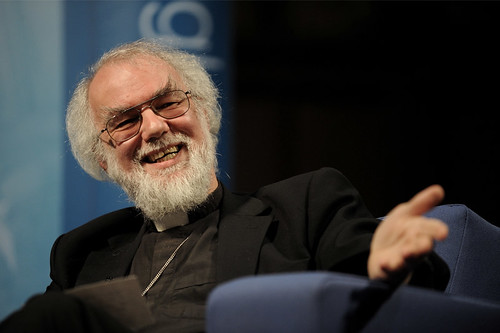
Archbishop of Canterbury Rowan Williams, the spiritual leader of the world's Anglicans, said Friday he will resign at the end of the year after a decade of turmoil over female and gay bishops.
The bushy-bearded 61-year-old announced in a statement that he would take up a position as master of Magdalene College at Britain's prestigious Cambridge University in January 2013.
"It has been an immense privilege to serve as Archbishop of Canterbury over the past decade, and moving on has not been an easy decision," he said in the statement, released by his office, Lambeth Palace.
"During the time remaining there is much to do, and I ask (for) your prayers and support in this period and beyond."
The Church of England could now see its first black Archbishop of Canterbury, with John Sentamu, the Archbishop of York, widely viewed as front-runner to replace Williams.
Williams' successor will be formally appointed by Queen Elizabeth II, who is the Supreme Governor of the Church of England. Lambeth Palace said Williams's intention to resign had been formally conveyed to the queen.
The actual decision will rest in the hands of a commission grouping senior churchmen and lay people, who will then forward their nomination to British Prime Minister David Cameron.
Welsh-born Williams was appointed the 104th Archbishop of Canterbury in 2002, replacing George Carey.
But his tenure was marked by his difficulties in maintaining unity amid disagreements over the consecration of female bishops in Britain, and of openly gay bishops in the United States.
The rows have threatened to cause a permanent rift with conservative Anglican bishops in Africa in particular.
Williams told the Press Association, Britain's domestic news agency, that his resignation comes ahead of a number of key events including a vote by the Church of England this year on whether to give final approval to women bishops.
"A number of what I call watersheds seemed to make this a reasonable moment, at least, to think about moving on," he said.
He admitted that the disagreements within the Church had been a "major nuisance" but insisted they had not clouded his tenure as Archbishop of Canterbury.
"Crisis management is never a favourite activity, I have to admit, but it is not as if that has overshadowed everything," he said.
"It has certainly been a major nuisance. But in every job that you are in there are controversies and conflicts, and this one isn't going to go away in a hurry.
"I can't say that it is a great sense of 'free at last'."
Sentamu said he had heard the news of Williams's resignation with "great sadness," saying he had been "much maligned."
"The last decade has been a challenging time for the Church of England and the Anglican Communion. Thankfully, Archbishop Rowan is a remarkable and gifted leader who has strengthened the bonds of affection," he said.
A decision to appoint Sentamu would have a whiff of controversy, however, as he last month agreed to write a weekly column for Rupert Murdoch's new Sunday edition of The Sun, Britain's top-selling tabloid.
Murdoch launched the paper to replace the News of the World, which he closed in July last year after a scandal over the illegal hacking of voicemails belonging to celebrities, crime victims and politicians.
Cameron described Williams as "a man of great learning and humility" who had "guided the Church through times of challenge and change.
"He sought to unite different communities and offer a profoundly humane sense of moral leadership that was respected by people of all faiths and none," Cameron said.
AFP, photo: Frighten




































